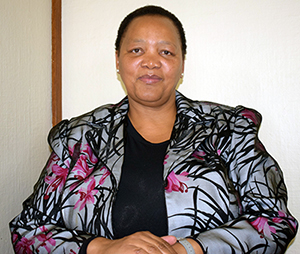
The African college of excellence in the social and human sciences

Prof Zethu Nkosi
Prof Zethu Nkosi is one dynamic women. She is a strong leader and a lover of nature who loves reading books, watching family movies and taking long walks. Her motto in life: Do unto others as you would love it done to you.
So it comes as no surprise that she was recently acknowledged for her research excellence by the Unisa Research, Postgraduate Studies, Innovation and Commercialisation portfolio.
As the recipient of the 2019 Women in Research Leadership Award, Nkosi says she is very grateful and humbled that the committee chose to acknowledge her as it is a confirmation that her mentoring of young academics at Unisa is appreciated. "This award is important as it encourages one to continue to lead in mentoring young academics to excel in their researcher and teaching scholarship. This is very fulfilling."
Nkosi joined Unisa in 2011 and is currently the Head of Teaching and Learning in the College of Human Sciences (CHS). She holds an MA and PhD in Nursing Management from the University of KwaZulu-Natal. Her research specialises in leadership and management, with staff retention and job satisfaction as niche areas.
She has published articles in accredited South African journals such as Curationis, Africa Journal of Nursing & Midwifery, and Health Gesondheid SA. Her articles have also appeared in international journals such as PLOS, Journal of Nursing Management, and the Global Journal of Health Sciences. She has also contributed chapters to locally published books, such as Dimensions in nursing and Leadership in nursing. Most of her publications emerge from research presented at conferences across Africa, Asia and Europe.
Explaining why her research is important, Nkosi says: "My research deals with leadership and management, which are important variables in ensuring that the strategies of the organisations are achieved. It involves leadership in my community engagement, which is infused in my teaching and learning. The majority of students who are supervised also fall under the focus area of leadership and management."
She said the mentorship of young academics has also yielded positive outcomes such as increasing the publication outputs in CHS as the candidates are supported in publishing journal articles in high-impact journals, presenting in local and international conferences, and also supervising their own students to completion.
"Additionally, for one’s self at a professorial level, one is expected to supervise both master’s and doctoral students to completion, publish widely in local and international accredited journals, present at conferences, lead by example, and be a role model to the young academics who still need much mentoring and guidance."
Speaking on the need for her research in her field, she said that the health industry needs nursing leaders who are capable of managing their organisations efficiently as this will be translated into good health outcomes.
Regarding the importance of her research for the continent, she said because Unisa provides leadership in the SADC region and the continent, its students are empowered to tackle their national issues in a more vibrant and vigorous manner.
* By Rivonia Naidu-Hoffmeester, Communications and Marketing Specialist, College of Human Sciences
Publish date: 2020/03/05